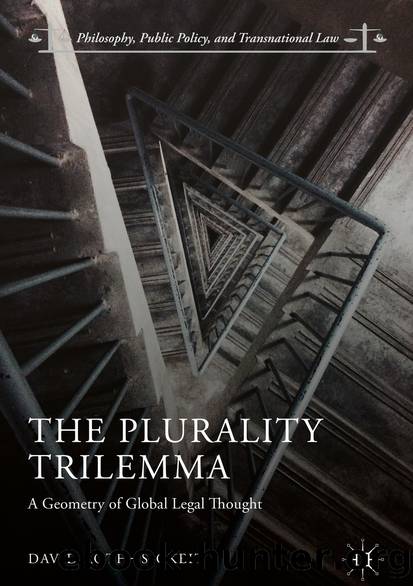The Plurality Trilemma by David Roth-Isigkeit

Author:David Roth-Isigkeit
Language: eng
Format: epub
Publisher: Springer International Publishing, Cham
4.1.2 Ecological Jurisprudence
Teubner advocates a pluralist doctrine of sources that facilitates the transfer of these fragments: actors are supposed to treat something as law as soon as regimes themselves treat it as such. The reference to the legal code alone (rather than some Grundnorm or pedigree criterion) is decisive for the determination of legality.22 The project of sociological jurisprudence thus transfers the normative decision on the validity of the law from pedigree to actual claims of social systems. Teubner’s normative project is directed at the recognition of a plurality of communication in the law.
This responsive legal doctrine is the basis for Teubner’s societal constitutionalism. In this project, he attempts to modify the hierarchical concept of law into a lively legal pluralism.23 Teubner fundamentally mistrusts the structural coupling of the political and legal system, which allegedly aims at hegemonic influence over other societal systems.24 In the modern concept of law, all power converges in the political system. With dramatic consequences, politics subjects other societal subsystems to its own logic. His normative concern is to preserve the plurality of functional subsystems and to prevent hegemony of single systems over others.
Pluralist jurisprudence in Teubner’s sense thus avoids a holistic concept of law that could be universally applicable across different function systems. This does not mean, however, the neglect of any criteria to distinguish between law and non-law. Teubner knows that the “law is dependent upon criteria by which it can determine its own boundaries.”25 Yet, function systems themselves must decide what counts as law. Teubner’s concept of law is thus not dependent on the state, yet can be applied from the internal perspective of legal participants.
In this concept, legal argumentation plays a crucial role. Legal argumentation does not decide cases, but it supports the decision in that it carves out the conflict: conflicts between societal rationalities do not enter the law directly, but only via reconstruction in the artificial language of the legal system.26 Since the legal system is operationally closed, the law does not deal with the actual societal conflict, but only with the insufficient translation in its own code. This alienation of the original conflict resolves the initial problem of undecidability, since the actual conflict is transformed using legal vocabulary into arguments that can be hierarchically sorted in terms of the legal system. The law does not decide conflicts; it produces judgments.27
Sociological jurisprudence allows a certain context sensibility of the law. For Teubner, this is a requirement of justice.28 The necessary undercomplexity of law toward its environment leads to a perspective of steady oscillation: law cannot adequately represent its environment, and this requires it to incorporate sociological knowledge. With the selective incorporation into the legal code, new injustices are created. These injustices again require the legal system to take a step toward its environment—an ecological process of law and justice, an eternal becoming. “What remains is nothing but a desperate searching which produces the permanent inner restlessness of law. New criteria of justice are relentlessly invented and new legal arguments constructed, and these very constructions destroy the possibility of justice.
Download
This site does not store any files on its server. We only index and link to content provided by other sites. Please contact the content providers to delete copyright contents if any and email us, we'll remove relevant links or contents immediately.
The Social Psychology of Inequality by Unknown(3031)
The Plant Paradox by Dr. Steven R. Gundry M.D(2620)
The Writing on the Wall by Anselm Jappe(2046)
Working for Yourself by J.D. (Nolo) Stephen Fishman(1873)
Get What's Yours for Medicare by Philip Moeller(1740)
Every Landlord's Legal Guide by Janet Portman & Stewart Marcia & Ralph Warner(1675)
The First 20 Hours: How to Learn Anything ... Fast by Kaufman Josh(1667)
ADHD on Trial by Michael Gordon(1578)
Decisive by Chip Heath(1568)
Working for Yourself by Stephen Fishman J.D. (Nolo)(1530)
Drafting Contracts: How and Why Lawyers Do What They Do, Second Edition by Stark Tina L(1499)
A Practical Guide to International Arbitration in London by Hilary Heilbron(1441)
The Lord of the Rings: The Fellowship of the Ring, the Two Towers, the Return of the King by J. R. R. Tolkien(1439)
Restitution by Restitution(1429)
The Economist Aug 8th 2015 by The Economist(1428)
Intellectual Property Strategy by John Palfrey(1425)
The Economist Aug 29th 2015 by The Economist(1392)
Collusion by Luke Harding(1323)
Persuasion by Owner(1298)
